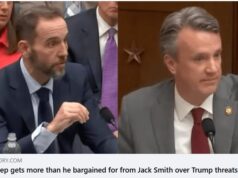 This past week, the superb chief political correspondent for Slate, Jamelle Bouie, posted an interesting article, entitled How a 2013 Governor’s Race Explains Clinton–Trump. The thesis?
This past week, the superb chief political correspondent for Slate, Jamelle Bouie, posted an interesting article, entitled How a 2013 Governor’s Race Explains Clinton–Trump. The thesis?
Right now, we’re living through a national, absurdist reboot of [the 2013 Virginia gubernatorial] election, if not a shot-for-shot remake. Hillary Clinton is playing the part of McAuliffe, with Trump in the role of Cuccinelli. The similarity between the two races is instructive, telling us something about what happens when elections turn into contests over identity. And what the Virginia election augurs for the aftermath of this fall’s vote is not exactly reassuring.
OK, so that had me intrigued, albeit skeptical. In the end, it turns out that I agree in part, disagree in part, and am ambivalent in part.
STRONGLY AGREE
- “McAuliffe and Cuccinelli represented two distinct paths for Virginia: forward in the direction of its cosmopolitan future—rooted in its long-standing black community and its growing immigrant one—or backward to its white, rural, and conservative (even reactionary) past.” Same thing in the 2016 presidential race, where Donald Trump would take America back…wayyyyy back, to a somewhat-mythical-but-nasty, authoritarian, racist “past” (again, somewhat mythical/somewhat factual) in which white men dominated and everyone else was basically screwed. In stark contrast, Hillary Clinton (or Bernie Sanders, if he were the nominee) would continue moving America forward as a diverse, vibrant, pluralistic, democratic (small “d”) nation.
- Again, the following paragraph is an excellent description for what was at stake in Virginia 2013, although obviously at a much smaller, less significant level than President and Commander in Chief of the United States. “This election isn’t just a fight over tax plans and health care; it’s a contest—a brawl, even—over questions of national identity. Just who is the United States for? Just whom do we mean when we say ‘Americans?’ On one side, we have immigrants, religious minorities, and the descendants of slaves, some disadvantaged, some on the upswing, but each committed to inclusion. On the other, we have an angry and frustrated white minority that’s perhaps still potent enough to win the White House.”
PARTLY AGREE
- I checked polling for the 2013 Virginia governor’s race, and at this point in the race (May 2013), neither Cooch nor T-Mac were particularly unpopular, nor was either particularly well known (unlike Trump and Clinton currently are). For instance, a May 16 Quinnipiac poll had T-Mac at +5 (22%/17%) favorable and Cooch at +7 (31%-24%). In contrast, a PPP poll on May 29 had Cooch at -12 (32%-44%) and T-Mac at -4 (29%-33%). As the cycle went on, Cooch stayed about the same in terms of approval while T-Mac got worse, at least in the last PPP poll of the cycle, which had Cooch at -13 (39%-52%) and T-Mac at -16 (36%-52%). In constrast, the last Quinnipiac poll of the cycle had T-Mac at -3 (42%-45%) and Cooch at -14 (38%-52%), the latter a 21-point drop from the May 16 Quinnipiac poll. So, bottom line: clearly, neither Cooch nor T-Mac were wildly popular, but not nearly as unpopular as Clinton and Trump are now — nor nearly as well known, which is perhaps the most important difference between the two races (Virginia 2013 and President 2016) at this point in the election cycle.
- T-Mac is not equivalent in many ways to Clinton. Unlike T-Mac, for instance, Hillary Clinton has been elected to high office — U.S. Senate twice — and was a major policy player (and First Lady, of course) in the Bill Clinton administration, in addition to serving as Secrtary of State, plus a lifetime of substantive work on policy issues. T-Mac, in contrast, was “a party operative who happened to have ambitions beyond fundraising.”
- Cooch is not equivalent to Trump in many ways. Again, Cooch has been elected numerous times, including to the Virginia State Senate (in 2002, 2003 and 2007), then as Attorney General (2009), before running for governor in 2013. For his part, Trump has never been elected to anything (and hopefully will never be!), but is simply a wealthy (at least we’re pretty sure he is; need to see his tax returns), slimy businessman who is “famous for being famous.” Trump is also starkly different than Cooch in terms of ideological consistency — Trump has had essentially none at all, fairly liberal until a few years ago and now all over the place but leaning sharply right (except that Trump doesn’t talk much about religion or “social issues”); Cooch has been a hard-line right winger and theocratic culture warrior pretty much forever. So again, Trump and Cooch are VERY different people, although both are heinous in their own unique ways of course. Ugh.
- I also don’t particularly agree with this: “Trump inhabits the same role as Cuccinelli: an outsider, of sorts, with a rocky relationship to his party establishment but one who inspires real devotion from his most serious followers. Trump is defined by his rhetoric as much as anything else…” But again, there are huge differences between Cooch, who was elected to the State Senate three times and AG once and was a hard-core Republican; and Trump, who has never been elected to anything and has certainly not been part of the GOP “establishment.” But yes, they both inspire “real devotion” from their “most serious followers.” Of course, so does Bernie Sanders, so does Hillary Clinton and so did Barack Obama in 2008, so I’m not sure what the exact point is there.
- The following paragraph is certainly a possible scenario, but whether it comes to pass or not depends upon whether Democrats can take back the Senate (we’ve got a good shot at that) and the House of Representatives (possible, but more of a long shot). If Dems DO hold the White House, but do NOT take back the House, then I think the following scenario is highly plausible, given the extreme nature of today’s Republican Party, as well as gerrymandering, right-wing echo chamber media and other factors which reinforce their unwillingness to compromise. “Far from making progress, the McAuliffe administration has been a rearguard action, a game of defense against highly partisan and organized Virginia Republicans... if the present of American politics looks like Virginia in 2013, then the near-future might be a replay of Virginia, right now: an ugly, ferocious election leading to a stalemate, as President Hillary Clinton attempts to accomplish something against a tough and recalcitrant opposition”
MOSTLY DISAGREE
- I’m not even sure what this means exactly: “If 2016 takes the same path as 2013 did for Virginia, we should expect an election where policy and ideas take a backseat to vicious political combat between two unpopular standard-bearers.” I mean, sure, the 2013 governor’s race was rough and tumble, as most governor’s races are, but I’m not sure it was particularly “vicious,” and I’m also not sure it was particularly devoid of “policy and ideas.” To the contrary, I’d argue that McAuliffe – who ran in 2009 as the candidate of “big ideas” – had plenty of “policy and ideas” (e.g., Medicaid expansion, protecting a woman’s right to choose, defending LGBT Virginians, promoting education and economic development, dealing with climate change, etc.) in 2013 as well. Cooch, of course, had TONS of “policy and ideas,” even if they were all bad ones. Certainly, both campaigns went after the other candidate as “extreme,” “corrupt,” and all that, but that’s pretty standard for political campaigns these days; nothing specific to Virginia 2013, as far as I can determine.
- Jamelle Bouie notes that McAuliffe had a “larger war chest” than Cooch. That’s undoubtedly true, but is it likely to replicated in 2016, with Clinton outspending Trump by a nearly 2:1 margin? I find that hard to believe.
STRONG DISAGREE
- I don’t agree with this (T-Mac had the “good fortune of having a libertarian candidate in the field, one who polled just south of 10 percent before the election and drew largely from Republicans dissatisfied with Cuccinelli”) at all. For more on this subject, check out Robert Sarvis didn’t cost Ken Cuccinelli the Virginia governor’s race (although note that this article’s written by Village Idiot Chris Cillizza, so maybe not a good one to cite); No, Robert Sarvis Did Not Cost Ken Cuccinelli the Election (“Sarvis actually received the majority of his votes from counties that were overwhelmingly won by Terry McAuliffe”); Sarvis Almost Cost McAuliffe the Election (“According to exit polls, liberal and moderate voters preferred Sarvis by nearly 6 to 1 over conservative voters. Nearly half of Sarvis voters told Quinnipiac that McAuliffe was their second choice.”); and Ken Cuccinelli and the Dolchstosslegende (“pre-election polls and the exit poll suggest that Libertarian candidate Robert Sarvis drew slightly more potential Democrats than potential Republicans;” also, definitely look up “Dolchstosslegende” — I had to, and it was well worth it!).
In the end, there certainly are some parallels between Virginia 2013 and the U.S. 2016 presidential election, but not many that are specific to Virginia 2013, and even fewer that are clear-cut. We’ll see about the result — a narrow win for Trump, a 2-3-point win for Clinton (as in Virginia 2013), or a blowout for Clinton (still the most likely scenario, IMHO, but who the heck knows at this point)? Stay tuned…



![Video: Former Eastern District of VA Federal Prosecutor Gene Rossi Asks, “Is Donald Trump going to be the lead counsel in that prosecution [of Jim Comey] and do the opening, closing and rebuttal? I pray that he does!”](https://bluevirginia.us/wp-content/uploads/2025/09/rossiedva-238x178.jpg)








